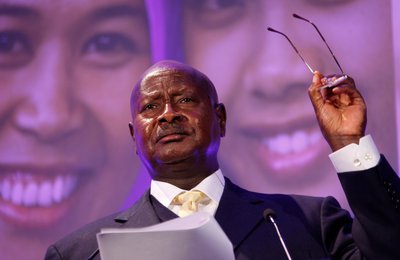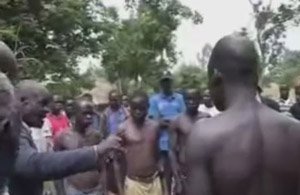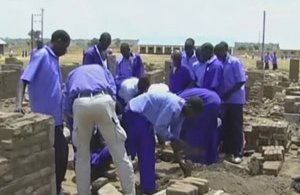 Churchill praised the beauty of Uganda, as epitomized by the Ugandan kob, which appears on the national flag. Photo by Floeschen, uploaded under a Creative Commons licence.
Churchill praised the beauty of Uganda, as epitomized by the Ugandan kob, which appears on the national flag. Photo by Floeschen, uploaded under a Creative Commons licence.In 1907, while touring Africa, Britain’s future Prime Minister Winston Churchill described Uganda as the 'Pearl of Africa.' Churchill was moved by Uganda’s exquisite landscapes and people. He wrote in My African Journey that, “For magnificence, for variety of form and colour, for profusion of brilliant life — bird, insect, reptile, beast — for vast scale — Uganda is truly the Pearl of Africa.” Advising his countrymen, Churchill added that, “The Kingdom of Uganda is a fairy tale. The scenery is different, the climate is different and most of all, the people are different from anything elsewhere to be seen in the whole range of Africa….what message I bring back….concentrate on Uganda.”
Churchill was right. Uganda then encompassed all the gifts of nature and diversity. The question now as we celebrate 50 years of political independence is: What are we today? For all the celebration and jubilation, would Churchill, if he were alive today, come to the same conclusion? What happened to the diversity, the stunning green vegetation, the beautiful climate? Are we still a fairy tale country or a horror story? For all its endowment in people and culture, scenery and resources, Uganda today is far from that Pearl, leading some observers to describe Uganda today as the “tarnished Pearl of Africa.” So what went wrong?
Uganda’s problem today has its root causes in the foundation of the state. In 1885, a group of colonial imperialists sitting in Berlin, Germany, by a stroke of a pen, arbitrarily divided the continent; over 50 different ethnic groups, all at that time independent and proud smaller nations, were lumped together into one country. From our inception as a state, the crafters of this new nation failed to acknowledge our diversity and cosmopolitanism. The naming of Uganda as a geographical entity was the first mistake, arising from a mispronunciation of “Buganda” by early colonial explorers. As a matter of right, therefore, the Buganda continually argued for greater recognition within the new state; and for all their historical contributions in enabling the crafting of this territory, who can fault them?
From 1894, when Uganda was declared a British Protectorate, until 9 October 1962, when the union jack was lowered and the black, yellow, and red stripes of independent Uganda was raised, the country endured 68 years of colonial oppression, exploitation and ‘divide and rule’ administration. The Colonial regime planted seeds of divisionism, hatred, violence, marginalisation, exploitation and oppression, which continue to bedevil the country and its people to date. Foreign religious beliefs were introduced which caused divisions in society, for example between Anglicans and Catholics. Marriage between religious sects became a taboo. The introduction of western religion also clashed with indigenous African religious beliefs, undermining peace and harmony in the community. It fuelled political conflicts as political groups divided themselves on the basis of religion. One was either a Catholic and a member of the Democratic Party, or a Protestant and a member of Uganda People’s Congress. The third option, the Kabaka Yekka, represented more of an allegiance to the Buganda entity. The tribal, religious, and political divisions drew the lines of disunity in this country forever. The policy of divide and rule caused division, tension and conflict between northerners and southerners. The British empowered the southern tribes through education for civil service, while northerners were left as a military reserve. Land and tribal territories were awarded to set the Banyoro against the Buganda.
All these cleavages have been exploited by subsequent post-colonial regimes to control and entrench their domination. Acknowledging and practically managing this diversity has proved impossible for us for the last fifty years, with disastrous results. Each government has represented an ethnic group or tribe exerting its power of control and domination over the others in very similar fashions. Fifty years after independence, the country of Uganda is merely a geographical entity where tribal and ethnic identity is stronger than national identity and one’s identity inherently determines his or her other sense of belonging and access to power and opportunities.
Since 1962, Uganda has witnessed a cycle of violence, political intrigue and armed conflicts as the preferred means of access to, and retention of, power. Over eight presidents have led the country at different times, but none have successfully and peacefully transferred power in a free and democratic manner. Coup d’états and rigged elections underpin our democracy. Corruption and impunity has become institutionalised in the last 26 years. Each regime have tended to empower its people at the expense of other groups within the country, leading to a series of rebellion and insurgencies around the country with devastating impacts and unaddressed legacies – all of which continue to haunt this country. Over 44 different armed groups have existed since independence, from different parts of Uganda; 28 of these have been active since 1986 alone.
The country is rife with conflict drivers at the national, regional and sub-regional levels. The country is soaked in corruption and greed, with growing economic disparities between the rich and the poor, leading to growing social unrest. The democratisation process is challenged by election rigging, growing intolerance to alternative political movements, the growing role of the military in politics and finally the domination of political power and wealth by certain tribes and regions. So when all the celebrations are done, questions remain: What will Uganda be in the next 50 years? How can we deal with the legacies of the past, and create reconciliation? What are the current drivers of conflicts and insecurity within the country? After a jubilee of conflicts, can we learn to live harmoniously and exercise conflict sensitivity in managing our diversity?
For God and my country!












